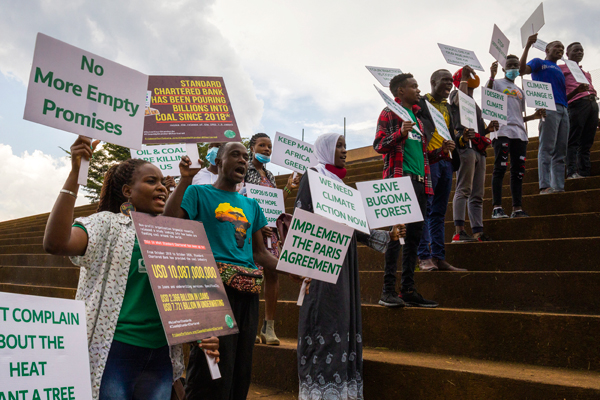Stop wasting money, gov’t advised

Young Ugandan environment activities hold placards bearing climate change-related messages directed towards the Ugandan government and other world leaders at Kampala International University in Kampala, Uganda, as part of the Fridays for Future global climate strike movement under the motto "No More Empty Promises" on March 19, 2021. AFP PHOTO
What you need to know:
- While closing the ceremony, the State Minister of Water Ronald Kibuule said the week’s events have clearly demonstrated that water and environment, as absolute necessities for people, planet and prosperity, are at the very core of sustainable development.
Government has been advised to prioritise its expenditures and stop wasting money by increasing the number of members of parliament and creating more districts and focus on water and environment protection.
“Many districts are being created and these come with increasing numbers of members of parliament. All this comes with money wastage and it must stop. Taxpayer’s money can be put to meaningful utilisation for the benefit of all Ugandans,” Mr Julius Mukunda,the executive director of the Civil Society Budget Advocacy group (CSBAG) at the Ministry of Water and Environment headquarters at Luzira during the closing ceremony of the forth week long Uganda Water and Environment Week (UWEWK) yesterday that started on March 21 2021.
During the event, it was revealed that there was a reduction of forest cover from 24 percent in 1999 to 12.4 percent as of 2020, whereas wetland cover degradation has reduced from 15 percent in 1999 to 8.9 percent, still in 2020. On average, approximately 600 tonnes of waste especially plastics are disposed of into water bodies.
Joseph Eyatu, the director of Water Development at the Ministry of Water and Environment decried of underfunding to the water and environment sector that receives only a meagre three percent of the national budget yet Uganda’s population increases by approximately one million people each year.
“You cannot talk of agricultural production when there is no water in many rural areas of the country. People in some areas travel for six hours looking for water and this is the time they would have spent in doing profitable ventures. More resources need to be invested in access of water resources by farmers to increase production,” Eyatu said.
Mukunda interjected in the matter, arguing that; “There is environmental tax levied on certain imports as well as value added tax on water. I don’t know how much of this money is reinvested into the water and environment sector because everything goes to the consolidated fund.”
While closing the ceremony, the State Minister of Water Ronald Kibuule said the week’s events have clearly demonstrated that water and environment, as absolute necessities for people, planet and prosperity, are at the very core of sustainable development.
The week has further highlighted the dependency of the country on the stock of environmental and natural resources to deliver water, environmental and natural resource goods and services in order to enhance production and productivity.
Minister Kibuule also alluded to the fact that provision of water for domestic use and for production remains a big challenge, with access to safe water in rural and urban areas of Uganda standing at 71 percent and in large towns at 79 percent respectively.
Kibuule concluded that a lot of efforts therefore need to be put into provision of water and sanitation services to reduce the disease burden, enable women and youth to be spared time for collecting water and promote production and hence employment and wealth creation.
The forth water and environment week provided an interface for knowledge exchange and dialogue on pertinent water resources issues among sector actors and other stakeholders. It was celebrated Water and Environment security for socio-economic transformation of Uganda.
The week-long event was sponsored by United Nations Development Programme, World Agroforestry Centre, Water Aid, Wash Alliance International, Water Resources Institute Uganda, Acode, Care, among other many partners.




